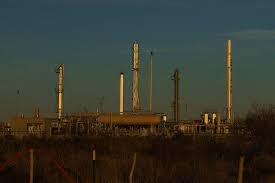Methane : New Study

According to a new study by researchers from the University of Gothenburg, a significant portion of the methane gas released from the ruptured Nord Stream pipelines in the Baltic Sea last September never made it into the atmosphere.
- Methane is the primary component of natural gas and is responsible for approximately a third of the warming we are experiencing today.
- Methane is a colorless odorless gas, flammable water insoluble gas.
- It is also known as marsh gas or methyl hydride.
- It is easily ignited.
- The vapors are lighter than air. Under prolonged exposure to fire or intense heat the containers may rupture violently and rocket.
- It is a powerful and short-lived greenhouse gas, with a lifetime of about a decade and Global Warming Potential about 80 times greater than that of carbon dioxide (CO2) during the 20 years after it is released into the atmosphere.
- The largest sources of methane are agriculture, fossil fuels, and decomposition of landfill waste.
- It harms human and ecosystem health.
- Its emissions lead to ground-level ozone pollution which causes approximately a million premature deaths per year globally and reduces crop productivity and harms ecosystems.




